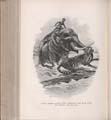
stnic.190410.001.001.jpg [illustration - "Chao Chahng struck him a sweeping side blow with his trunk." (See page 1064.)]
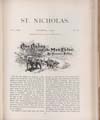
stnic.190410.001.002.jpg
Chao Chahng and the Man Eater.
ANY one who thinks the elephant a slow, clumsy beast would have cause to change his opinion on seeing him at work along the rivers of northern Siam. The rainy season, which begins in April, is the time when the teak logs, cut during the dry season in the forests about the upper waters of the Menam River, are floated down to Rahang, where they are caught and rafted to Bangkok. Instead of red-shirted, spiked-shoed "river-drivers" such as handle the logs in their downstream journey to the sawmills on the Penobscot and Kennebec in Maine, the "lumber-driving" of the Siamese rivers is done by barefooted, half-naked men on elephants, and the "bone" labor and much of the thinking involved in the operation are done by the elephants.
The middle of June, some years ago, found the drive of teak logs that I was
taking down the Me-ping River about half-way on its journey from the cuttings to
Rahang. My crew consisted of twenty elephants with their Shan and Lao mahouts,
or keepers, who drove the logs, and as many bullock-drivers, choppers, and
men-of-all-work to attend to the camps and haul supplies. Boats were needless,
for there was no water too deep or current too strong for the elephants, who
went up and down the steepest slopes and over rocks like great cats as they
patrolled the river, rolling into the current with heads, trunks, and tusks the
logs stranded along the channel, or wading out into cataracts to break a forming
jam. All these elephants were tuskers, except my riding elephant, Lala, and the
biggest and strongest and most docile of all was Prahada's elephant, Chao
Chahng, the
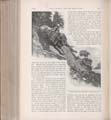
stnic.190410.001.003.jpg
[illustration - "Stretching both fore legs straight out before him, he went sliding
down the slope." (See page 1063.)] chief, who stood ten feet high at the shoulder. Prahada was a northern
Lao, a thorough maw chahng, or elephant-master, who, like
all good mahouts, was on the best of terms with his animal, and I had learned
that the two were to be depended upon to carry through the hardest jobs that by
any chance might come up in the day's work.
In camping in the forest it was not unusual for us to find, of a morning, the tracks of some wild animal which had reconnoitered the camp during the night. Such a discovery excited no particular alarm, as the prowling beasts of Siam commonly avoid man, and the worst that was looked for from a tiger or panther was that he might spring upon a straying buffalo or goat. Hence it was the unexpected which happened, when a tiger one evening, with the whole camp awake, seized a man who had gone a few steps from one of the fires to fetch wood to replenish it. At his outcry and the sound of the tiger's growl, the Shans and Laos, realizing at once what was to be done, caught blazing brands from the fire and rushed to their comrade's rescue. A brand flung at the tiger struck him in the head, causing him to drop the man and sneak away in the darkness. The tracks of the tiger showed him to be a very large as well as bold one; but after his experience with the firebrand, he was not likely, so the men assured me, to venture into the camp again while fires were burning there. The man was not dangerously hurt, and we hoped that our troubles from wild beasts were ended, as they had begun, with this visit.
But we were not to be rid of the tiger so easily. He was lurking along our line
of work on the river next day, as the alarm shown by the elephants on several
occasions testified. When night came on and most of the men and elephants were
back in camp, Prahada, who had been sent that day far upstream, had not
returned. Presently the crashing sound of an elephant coming at full speed was
heard in the forest, and soon Chao Chahng appeared in a state of great
excitement, and Prahada was not on his back. He halted among the other
elephants, and then we saw that his back was torn by a tiger's claws. I made up
a searching-party, and by the light of torches we went

stnic.190410.001.004.jpg back over the elephant's trail for half a
mile. Then rain began to fall, ending our search, as it blotted out the tracks,
and we returned, having found no sign of Prahada.
The story of the tragedy we never learned except as it was written in the wounds on Chao Chahng's back. The claw-marks showed that the tiger had leaped on him from behind, and, as was to be expected, he had run away, for an attack from that quarter will throw the bravest and steadiest elephant into an uncontrollable panic. Whether Prahada slipped to the ground, was pulled down from his seat by the tiger, or was brushed off by the big elephant's running under a tree could only be guessed at, for no trace of him was ever found. That the tiger which killed and carried him off was of uncommon fierceness was shown by his leaping upon an elephant so formidable in size as Chao Chahng.
There was reason to fear that the big elephant, having felt the tiger's claws, and missing the mahout to whom he was accustomed, might refuse to work again on the river; but Prahim, a cousin of Prahada, took Chao Chahng out next day with the others and put him through his tasks without trouble. It was evident that the great creature mourned for his dead master, as was shown by his restlessness at night, and by his utterance of a moaning sound from time to time, very different from the grunt and snort of the other elephants. That the great, patient creature was to be the avenger of his slain master no one in the camp could have thought or dreamed.
The tiger gave no further sign of his presence either by day or night about the camp, where, for precaution, fires were kept burning from sunset to daylight. The following day some of the elephants working above the camp showed fear of something that they saw or scented in the undergrowth on the river-bank; but as I sent them out now in companies of three together, the tiger, if he was lurking about, did not venture to attack any of them. But he prowled near the camp that night, as we saw by his tracks next morning.
"To-day— one, two, three since Prahada went," said a Lao forester to me, holding up his fingers one after another to signify the lapse of days; and shaking his head gloomily, he added: "Now the tiger will come back again."
After the recent tragedy, with the knowledge
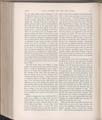
stnic.190410.001.005.jpgthat the tiger which carried Prahada off was awaiting his chance for the next
victim, it was a matter of course that both elephants and men should become
demoralized and that work should lag. Several of the men, two with elephants,
quit my service under various pretexts, but really from fear of the tiger, and I
knew that if another man were carried off by him it would mean a general
stampede of my force. With the purchasing firm at Bangkok impatiently awaiting
the news of the arrival of the logs at Rahang, I had to see my work hindered and
in danger of coming to a standstill through one murderous brute, which could not
be killed or frightened away, unless by some accident, which was not at all
likely. I carried my repeating-rifle on my trips from the camp, partly in the
hope of catching a "snap-shot" at the tiger, but more to inspire my men with
courage and confidence; and further to inspirit them I added fowls to their
ration of rice, made presents of fancy cloths and tobacco to the subforemen, and
promised that every elephant-driver should receive five silver coins beyond his
stated pay if the logs were all down at Rahang by the first day of July.
The tail of the drive was lodged at some rapids five miles up the river, and by clearing these it would be practicable to move camp a day or two later, which might take us below the ranging of the tiger, who had made his presence known to us in every instance from somewhere above the camp. None of the men or elephants liked to be sent in this direction, and so for this work, on the third day, I detailed four of the best tuskers and drivers, and accompanied them on my riding elephant. My presence, with the rifle slung to my riding-pad, gave courage to the men, which was imparted to their elephants, and they worked so well that by the middle of the afternoon the rapids were cleared.
Below the rapids the river broadened into a long pool a quarter of a mile wide, and of a depth of three or four feet except where the current had cut a deep channel along the foot of the high eastern bank. At the edge of the rapids on the east side, as I waited for Chao Chahng to push the last log into the current, I called to the three mahouts across the stream to keep on down the west bank, intending myself to take a forest path leading to the foot of the pool on the east. They had disappeared round a bend in the shore, and Lala was leading the way up the east bank from the river, when my rifle slipped from its slings and fell upon the rocks. At his mahout's command, Chao Chahng, coming on behind us, picked it up with his trunk and passed it back to me, when I found that the hammer was jammed by the fall and so would not work. We got upon the high ground, and I was hoping as we went on that the tiger would not take this time to show himself, when we heard the three elephants across the river all trumpeting together. Something in their note our animals seemed to understand, for at the sound Lala opened out her ears like fans and quickened her pace, and I could hear the big elephant gathering speed behind her. Another minute and Chao Chahng, acting as if he were beyond all control of his mahout, rushed past us and soon was lost to view among the trees ahead.
Suspecting the cause of the trumpeting, I told my mahout to keep as close after Chao Chahng as he could, and we hurried along until, in making a cut-off from the path, we came in view of the river, and the mahout, bringing Lala to a sudden halt, pointed with his hand out upon the pool. Above the surface near the opposite bank was the black-and-yellow head of a swimming tiger, the ripples of his wake widening back to the low, wooded shore, while after him into the water came the three elephants with their mahouts urging them on. They had discovered the tiger crossing the river, and knowing that in the water he was helpless to attack them, the mahouts had not hesitated to put their elephants at him. The tiger, realizing his disadvantage, was swimming fast for the eastern bank, with excellent prospects, as far as we could see, of making it safely, for Lala was of no use against him, and Chao Chahng, who might possibly have headed him off in the water, had run away.
With my rifle useless and believing that Lala would bolt as soon as the tiger
touched the shore, I was thinking of following the big elephant's example, when
I heard him coming back. He had been running, not from fear, but

stnic.190410.001.006.jpgto search out a place where he could get
down to the water without breaking his neck, and now he emerged from the woods
at the brink of the high bank in line with the course in which the tiger was
swimming. He advanced, testing his footing, until the dirt at the edge,
crumbling under his feet, began to rattle down to the water; then stretching
both fore legs straight out before him, he curved his big body over the brink,
and went sliding down the slope. The tiger, seeing him coming, turned back
toward [illustration - "Here he bristled and roared, while the four elephants came up and
lined themselves around him."] the middle of the stream. The bank fell fifty feet down to the water,
and was very steep, and how Chao Chahng avoided turning a somersault or two on
the way is a mystery; but somehow he kept "right side up," and, with Prahim
hanging desperately to the girth to save himself from dropping over his head, he
plunged into the water. From a fountain of mud and spray his trunk emerged, and
then the top of his back, moving out into the river, with the mahout climbing to
his place on the neck. Like a monitor in a running tide the elephant propelled
himself across the deep channel, and, gaining his footing in the shallower water
beyond, he loomed up, confronting the tiger, which turned and swam to a great
boulder that rose some three feet above the water's surface, and scrambled upon
it. Here he bristled and roared, while the four elephants came up and lined
themselves around him. At my command, the mahout turned Lala back toward the
cataract, and fording the river there, forced her out into the pool above the
other elephants, where she took a position from which I could see all that went
on.
Had my rifle been in working order I could have settled matters with the tiger
where he stood, for no hunter could have asked for a surer shot than he
presented. With my rifle disabled the situation was quite another thing. On the
rock the tiger stood level with the shoulders of the elephants, and for them to
close in upon him where his spring would land him squarely upon the nearest
one's head was too much to expect of elephants or mahouts. From a safe distance
away they trumpeted and threatened him with their trunks, but came no nearer,
while the tiger, facing one and another in turn, made feints of springing upon
each, but refused to quit the rock. Even Chao Chahng, who plainly was there for
business with the tiger, was not disposed, with the scratches still fresh on his
back, to give him a second chance to find a
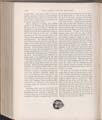
stnic.190410.001.007.jpgfoothold there. And all the while we were so near the tiger that I could see
the line of singed hair along his head where the firebrand had struck when he
tried to carry away the man at the camp a few nights before.
After a half-hour of waiting, with nothing gained, I was debating with myself whether a fire-raft would be more likely to dislodge the tiger than to stampede the elephants, when the muddy water grew more turbid and I could see that it was rising round the rock. A rainfall somewhere up the river was the cause of the change, which might indicate a trifling rise or a sweeping freshet. The elephants already were quite deep in the pool, and if the water kept on rising it was certain that they would not stay until it was high enough to force the tiger from the rock. In five minutes, however, the water had risen a foot, and the elephants now were looking anxiously from the tiger up to where the rapids were beginning to roar with the coming flood. Every tropical beast stands in supreme dread of an inundation, and the tiger turned from his besiegers to sniff and growl in a new key as the roar of the cataract grew louder and the rising water washed up against his paws. With the stream surging against their shoulders, the elephants shifted about in their tracks so as to face the current, and the mahouts had to keep up a continual shouting, and work their great-toes vigorously against the backs of the flapping ears, to prevent the uneasy animals from returning to the shore. Only Chao Chahng held his ground, facing the tiger, while Lala, shuffling round uneasily, seemed undecided as to whether her safer course were to remain under his protection or to take to her heels.
Something drifted past me toward the rock—a great teak log that the rising water had brought down from somewhere upstream. As it scraped along the rock the tiger several times seemed on the point of stepping upon the log. He hesitated, but just as its rear end was passing he glided upon it. The heavy log, floating deep in the water, sank lower beneath his weight as, crawling to the middle of it, he was borne from the rock. While the other mahouts vainly tried to force their elephants to the log, Chao Chahng, at Prahim's word, pushed swiftly forward upon the tiger, who, balancing himself upon his unsteady support, could move only forward or backward. At sight of the tusks and upraised trunk above him, the tiger, turning, with a whine of fear crept swiftly back on the log, evidently hoping to regain his place on the rock. But Chao Chahng, following his movement, struck him a sweeping side blow with his trunk that sent him flying into the water. The other tuskers, no longer to be restrained, were plunging for the shore, and Lala bolted after them. I caught one glimpse of the big elephant rushing upon the tiger struggling at the surface, and after that, while Lala took the rocks and holes at the bottom, I was kept too busy holding myself by the ropes to the pad to turn my head until we were at the shore. Then, looking back, I saw the water swirling over the rock, and above the surface only the floating log, and Chao Chahng stalking shoreward through the flood with the air of having just discovered that the river was rising.
We made our way down the shore to the camp, where the men, on learning that the man-eater was killed, built bonfires in rejoicing, and, to the accompaniment of flute and pipe, sang songs for half the night in celebration of Chao Chahng and his victory over the tiger. The river rose five feet in an hour, and when it had subsided next day the tiger's body was found a mile below the pool, stranded on a bar. It had been too long in the water for the skin to be worth saving, but I wore one of his claws on my watch-guard at Rahang on the Fourth of July, which day found our camp there, with all the logs in boom, ready for rafting.